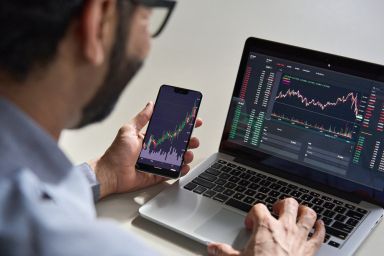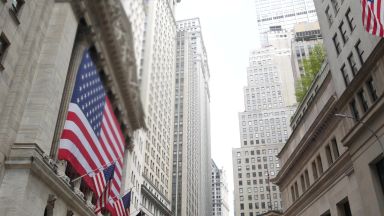Featured articles

Why Michael Burry just sold all his stocks
Michael Burry just sold over $70 million in stock, liquidating his entire portfolio except for one stock, doubling down on a company that other investors are fleeing in droves.
15:28, 18 July 2025

Euro forecast 2025-2030: Third-party targets
EUR/USD is trading at 1.17648 as of 10:26 UTC on 9 September 2025, holding near the upper end of its intraday range of 1.1706-1.1779 amid broad-based US dollar weakness.
09:44, 16 September 2025

Crypto CFDs: Popular cryptocurrencies for trading
Discover which cryptocurrencies are trending for CFD trading in 2025 – from bitcoin to newly listed coins like SUI and PEPE.
10:46, 31 July 2025

Microsoft stock forecast: Third-party targets
Microsoft (MSFT) is trading at $506.65 as of 13:48 UTC on 10 September 2025, just above its intraday high of $506.60 and well clear of the session low of $497.71.
37 minutes ago

Wall Street pushes higher as US Government heads for another shutdown
The US Government heads for another shutdown, potentially delaying economic data and leading to permanent lay-offs.
49 minutes ago

Tesla earnings: When's the next TSLA call?
Tesla earnings reports are among the most closely followed events in global markets. For CFD traders, these quarterly updates present opportunities as well as risks that require careful management.
an hour ago

Accenture stock forecast: Third-party price targets
Track the latest Accenture stock predictions, analyst targets, technical overview and client sentiment.
2 hours ago

Wall Street pushes higher as US Government heads for another shutdown
The US Government heads for another shutdown, potentially delaying economic data and leading to permanent lay-offs.
49 minutes ago

Trading the Nasdaq 100 Amidst AI Investment ‘Circular’ Doubts
It has yet to undo its current bullish technical overview, but in sentiment there’s been an increase in sell bias among CoT speculators.
06:46, 25 September 2025

Trading the Dow 30 After its 46,000 Breach
Recent record high as kept its technicals bullish in both time frames, but on the CoT sentiment front there’s been a notable increase in net short bias.
08:53, 22 September 2025

Volatility index forecast: Third-party VIX price target
Discover the Volatility Index forecast for 2025 and beyond, with third-party analysts’ VIX targets and more.
08:31, 16 September 2025

Gold (XAU/USD) set to shine if government shutdown drags
The government shutdown is expected to have a limited impact on markets as the tangible effects on growth are small, but gold is likely to remain bid as traders sell some risk
39 minutes ago

Wall Street pushes higher as US Government heads for another shutdown
The US Government heads for another shutdown, potentially delaying economic data and leading to permanent lay-offs.
49 minutes ago

Cocoa price forecast: Third-party price targets
US cocoa was trading at $7,398.50 at 14:53 UTC within its intraday range of $7,138.90-$7,483.40, while UK cocoa was at $5,149.10 in a session band of $4,979.70-$5,185.50.
16:29, 29 September 2025

Natural gas forecast: Third-party targets
US Natural Gas (NGc1) was trading at $3.20 per mmBtu as of 15:08 UTC 2025, in an intraday range of $3.1553-$3.2850; the price was near the midpoint of the session.
15:26, 29 September 2025

Wall Street pushes higher as US Government heads for another shutdown
The US Government heads for another shutdown, potentially delaying economic data and leading to permanent lay-offs.
49 minutes ago

USD EGP forecast: Third-party predictions
USD EGP Forecast | Egyptian Pound Outlook for 2025–2030
12:59, 24 September 2025

USD TRY forecast: Third-party outlook
US dollar/Turkish lira (USD/TRY) was trading at 41.2837 at 15:00 UTC on 15 September 2025, within an intraday range of 41.0993-41.3709.
13:52, 19 September 2025

Euro forecast 2025-2030: Third-party targets
EUR/USD is trading at 1.17648 as of 10:26 UTC on 9 September 2025, holding near the upper end of its intraday range of 1.1706-1.1779 amid broad-based US dollar weakness.
09:44, 16 September 2025

Avalanche Price Prediction: Third-party outlook
Avalanche (AVAX) was trading at $31.25 on 22 September 2025 at 11.43pm UTC, moving within an intraday range of $30.37-$33.36.
18 minutes ago

How does Elon Musk impact cryptocurrency prices?
In cryptocurrency markets, few individuals command as much attention as Elon Musk. The CEO of Tesla and SpaceX’s tweets, Tesla and Dogecoin announcements, and public statements can trigger periods of heightened volatility, with shifts in buying and selling pressure across digital assets.
13:29, 30 September 2025

Cardano price prediction: Third-party outlook
Cardano (ADA) is trading at $0.82, moving within a daily range of $0.82-$0.90. The price stood at $0.824 at 12.12pm UTC on 22 September 2025.
11:12, 29 September 2025

Dogecoin price prediction: Third-party outlook
Read third-party DOGE price predictions for 2025–2030, covering third-party analyst targets, technical overview, and CFD sentiment.
13:31, 26 September 2025
